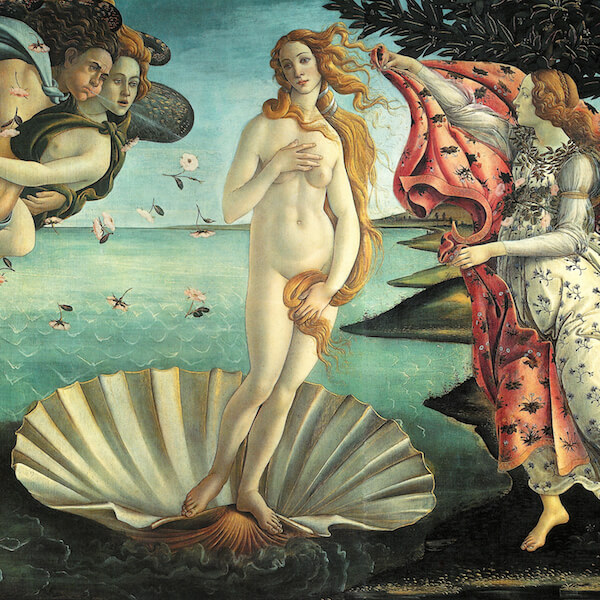
Who Was Aphrodite?
Aphrodite (Αφροδιτη) was the Greek goddess of love, beauty, pleasure, and procreation. Known to the Romans as Venus, her beauty was unrivaled among the gods, earning her the title of most beautiful. Aphrodite possessed an enchanted girdle that gave her power to make anyone fall irrevocably in love with her. Even Hera borrowed this to rekindle Zeus’s desire.
Though officially wed to Hephaestus ((Ἡφαιστος), god of craftsmen, this was not a love match. Aphrodite’s heart truly belonged to Ares (Αρης), the god of war, with whom she had a passionate, longstanding affair.
Aphrodite’s Birth
How exactly did Aphrodite come into the world of the gods? Well there seems to be two main theories. One we know much more about. Let’s explore each.
Sea-foam Birth
Aphrodite’s parentage and origins were a source of divergent myths revealing the evolving, complex nature of Greek religious beliefs over centuries. According to the ancient poet Hesiod (Ἡσίοδος), Aphrodite was born from the sea foam created when the severed genitals of the primordial sky god Uranus (Ouranos – Οὐρανός) were cast into the ocean by his son Kronos (Κρονος). As the story goes:
One night, Uranus, the personification of the Sky, came down to see his lover, Gaia (Γαῖα), the personification of Earth. While laying naked with her, Uranus’ son, Kronos (Κρονος), King of the Titanes and the god of time, ambushed him with a jagged sickle. In one foul swoop, Kronos cut his Father’s genitals off and threw them into the ocean. When they crashed into the ocean, a huge white foam was created in the vary spot and spread outside. There in the center, standing naked atop a scalloped shell, stood an immortal woman. She was given the name Aphrodite, deriving from Aphro-geneia (the foam born) and Anadyomene, which translates to, “she who rises.”
She would eventually ride those scalloped shells to shore along side Eros (Ερως), the god of love (commonly known by the latin equivalent – Cupid), and Himeros (Ἱμερος), the god of desire. There are some references (specifically by the Romans such as Ovid and Seneca) that say she was pregnant with both Eros and Himeros and that she birthed them right after she herself was born.
This story symbolized Aphrodite’s embodiment of unbridled feminine allure and sexual potency, while her emergence from the foaming waves paralleled female orgasmic sexuality. The scalloped shell represented her as both a creative life-giving force drawn from masculine dissolution, and a mature, self-sufficient incarnation of female beauty and eroticism.
Zeus and Dione
By contrast, in Homer’s Iliad Aphrodite appears as the daughter of Zeus and the titaness Dione. For example, during Homer’s epic, he talks of Aphrodite being wounded by the fierce warrior, Diomedes (whose only bettered by Achilles) on the battlefield of Troy. Once she’s wounded, she flees to her mother Dione. Later on, when we learn of Hephaistos’ threat to tell Aphrodite’s father, Zeus, of her adultery with Ares. While there is little here to gather how her birth came to be, by some, Zeus and Dione are her mother and father.
Here the King of the Gods fathers a being of supreme aesthetic and erotic power. Her heritage highlights her rightful place among the ruling Olympian pantheon, while the vital, procreative aspect of her nature links her to the ancient fertility mother goddesses that predated them.
Between the 8th and 2nd centuries BC, Aphrodite’s origins steadily became more divine, reflecting Greek thought elevating the gods over titanic elemental forces. The cosmic quality of love and beauty was increasingly recognized as a profound, eternal force expressed through Aphrodite as the supreme companion to and representative of the sky and ruling gods.
Aphrodite’s Family
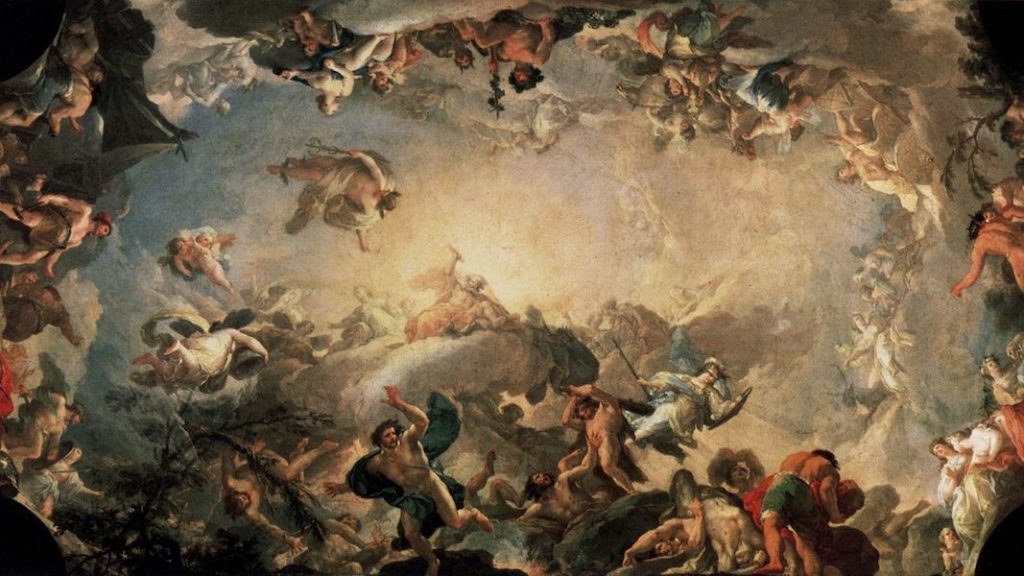
Whichever account is told, Aphrodite’s divine lineage embedded her at the heart of the volatile relations between the Greek gods. If Zeus truly fathered her, she was entangled in Olympian power struggles. Notorious good looks inspired sibling rivalry with jealous goddesses like Athena and Hera, driven by her peerless desirability. Though charming, her beauty roused resentment and envy. Siding strategically with scheming Hera reinforced matriarchal power, but risked advances from philandering Zeus himself.
Divine half-siblings like Apollo, Artemis, belligerent Ares, Dionysus and trickster Hermes threatened rivalry and wrath. But with clever seduction or secret knowledge she could manipulate affairs to settle disputes and punish foes.
Children
From lover Ares sprang the immortals Eros and Himeros, deities of desire and longing bound to their mother. If not born with her from primordial sea-foam, their birth reflects primal attractions – sensuality, intimacy – her realm governs. Other notable children were Harmonia (concord), Peitho (persuasion). Occasionally Ares or others also fathered offspring like Priapus (fertility) or Hermaphroditus, a dual-gendered deity embodying love’s fusion of opposites.
So Aphrodite’s motherhood spanned both love’s creative forces and destructive extremes of erotic obsession. Her progeny reflected the profound impact, both harmonious and chaotic, of the primal life forces she ruled over.
Overall, we’re left with:
Aphrodite’s Potential Siblings
This is a tricky one. If we take into account her sea-foam birth, then her relation to any of the other Greek gods doesn’t seem to fit. If however, he father was in fact Zeus, then she’s related to some of her fellow Greek gods. If that’s the case, her siblings would be.
- Apollo
- Ares
- Artemis
- Athena
- Dionysus
- Hermes
She’s also listed with having many others, even Helen of Troy as a half-sister, however there is lots of conflicting information. Above are her main siblings from the gods perspective.
Aphrodite & Ares’ Children
Most of her children were with Ares, so we’ll start there.
- Phobos (Φόβος) – greek god/personification of fear.
- Deimos (Δεῖμος) – greek god/personification of terror.
- Harmonia (Ἁρμονία) – goddess of harmony and concord.
- Eros (Ερως) the god of love (some myths say she gave birth to him as she was born, others say that she had him with Ares (see Aphrodite’s birth above).
- Anteros (Ἀντέρως) – god of requited love (returned love)
Aphrodite’s Children With Other Gods
Dionysus
- Lakkhos (Ιακχος), god of the Eleusinian Mysteries
- Peitho, goddess of persuasion ( this is debated however)
- Priapus (Πριαπος) – god of vegetable gardens (also attributed to Zeus and Adonis)
Poseidon
- Rode (Ροδη)The goddess of the island of Rhodes
Hermes
- Hermaphroditos (Ἑρμαφροδιτος) – god of hermaphrodites and of effeminates.
Adonis
- Beroe (Βερόη) – nymph of Beirut who married Poseidon.
Final note to Aphrodite’s children.
There are many myths that both affirm and contradict some of these children. Furthermore, she’s also credited with more, but these listed above are the main ones. A great resource for further exploring this is Theoi – Aphrodite’s family.
Aphrodite’s Powers of Love & Desire

Supreme among Aphrodite’s powers was that of her magical girdle, instructed with alluring beauty and desire. When she wore this, no mortal or god could resist falling madly in love with her. She prudently loaned this to others when she wished to cast her enchanting sway, such as when intervening in family spats among the deities.
Alongside this were her subtler, more holistic charms. Classical sculpture and artwork captured Aphrodite’s spellbinding physical perfection. Gracefully proportioned and flawlessly beautiful, she carried herself with alluring poise and airs of eternal, ineffable youth.
Her beauty radiated a soft, warm glow, literally casting light over all she touched. Aphrodite’s mere presence enchanted the senses, unleashing tremors of unmediated sensation and longing. The rustle of silk, a whiff of jasmine, the curve of a smile – even minor gestures suffused the aura surrounding her with intoxicating bliss.
Thus Aphrodite channeled universal love as the essential force of generation, harmony, and life itself into a uniquely feminine erotic form. She expressed its creative energies through profound rapture, enticement, and deep emotional bonds between lovers. Yet she also wielded its devastating potential – wielding her charms wrathfully to inspire fatal jealousy and chaos.
Aphrodite’s Husband
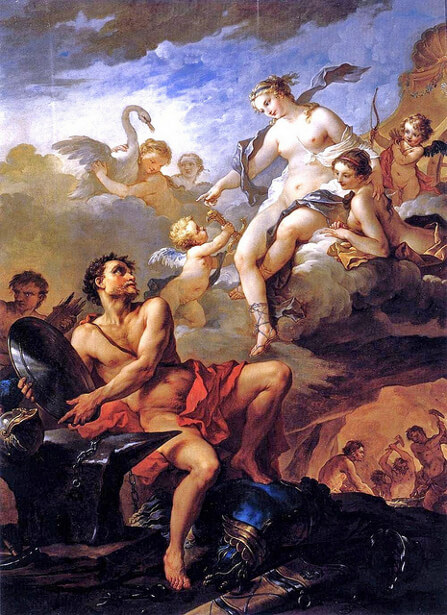
Yes, it’s true that the Greek goddess of love, beauty, pleasure, and procreation was in fact married. However, during her life, she loved Ares and spent most of her time with him and birthing his children. Why then was she in fact married to someone else? Well, Zeus offered her as a prize.
How Hephaestus Won Aphrodite
Hephaestus, in ancient Greek, Hephaistos (Ἡφαιστος), was the god of fire, smiths, and craftsmen, grew up on earth, but was actually the son of Hera, the queen of the gods. However, upon his birth, Hera noticed he was crippled. Ashamed, she threw him from the top of Mt. Olympus down to Greece. There, the goddess of water and mother to Achilles, Thetis (Θέτις), raised him. He grew up and became an expert blacksmith with the ability to craft anything. (fun fact: Hephaistos is the one who made Achilles’ impenetrable armor.)
Hephaistos grew up with a hatred for his mother for disowning him. Once he mastered his craft, he devised a plan for revenge. He began sending gifts to the gods in homage, and to his mother, Hera, he sent a beautiful golden throne. When Hera sat upon it, the curse unlocked and she was cased and bound to the chair – unable to move.
With his wife stuck to the chair, Zeus became enraged. He called upon the gods to help free Hera. In return, he would offer Aphrodite (Αφροδιτη) the Greek goddess of love, beauty, pleasure, and procreation as a reward. Those who succeeded in bringing Hephaistos to Mount Olympus would be able to marry her.
Aphrodite felt that her true love, Ares (the god of war), couldn’t lose. Fighting is what he did. Thus, she accepted and agreed to the arrangement, with the firm belief that Ares would return victorious and they could finally marry.
Ares readied his spear, grabbed his shield and descended to face Hephaistos. The god of war intended to be victorious and win Aphrodite’s hand in marriage. Ares stormed the place where Hephaistos was hiding and begin his assault with all he had. While Ares was battering the forge where Hephaistos was hiding, the skies turned red. From overhead, flaming metal rained down upon Ares. He was thus forced to retreat and return to Mount Olympus defeated. The god of war had lost.
Dionysos (Διονυσος), the god of wine, was the next to attempt to bring Hephaistos back. However, with the benefit of going second and seeing the flaming metal descend upon Ares, he knew force wouldn’t work. Thus, he peacefully approached Hephaistos and convinced him that if he would freely and voluntarily return to Mount Olympus with him and free his mother, he would be rewarded with the hand of the Aphrodite. This excited Hephaistos, as he’d marry the goddess of beauty; so he returned, freed Hera and married Aphrodite. However, the goddess of love was is much disarray and did not wish to marry him, but was forced. It was a sad day for her and Ares.
Aphrodite’s Lovers
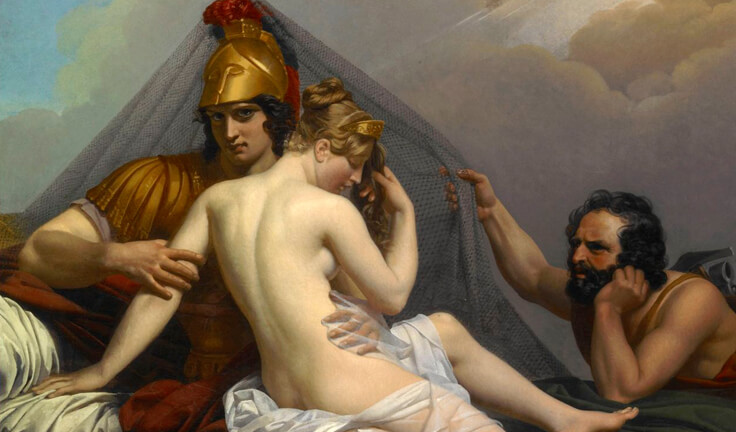
Ares
Though wedded to Hephaestus, Aphrodite’s heart yearned for her longtime paramour Ares, the god of war. Their passionate affair produced many notable offspring and they were frequently depicted together in art and myth (one of the most well known is the reason the rooster crows at the sun). In the Trojan War they even fought side by side aiding the Trojans. Ares was her true love, the union she would have chosen if given the choice.
Who Were Aphrodite’s Other Lovers?
But Aphrodite’s irresistible charms attracted many divine admirers. Zeus the king of the gods did not escape her allure. Nor did the gods of revelry, wine and trade – Dionysus, Hermes and her official spouse Hephaestus. Some say, however, that Adonis the tragically slain hunter was the love of her life, cut down in his prime by a wild boar sent in jealousy by Ares or Artemis.
The immortals Eros and Himeros, gods of desire itself, were born of her couplings. But Aphrodite also seduced gods like Poseidon to mother figures like Peitho (persuasion) or Hermaphroditus – deities representing complex, complementary forces within her unifying domain. Aphrodite’s sensual exploits reflect the uniquely totalizing nature of her sovereignty over all aspects of love, beauty and intimacy.
She was also linked to a few other lovers throughout the Greek myths, but these are the main ones.
Aphrodite Causes The Trojan War
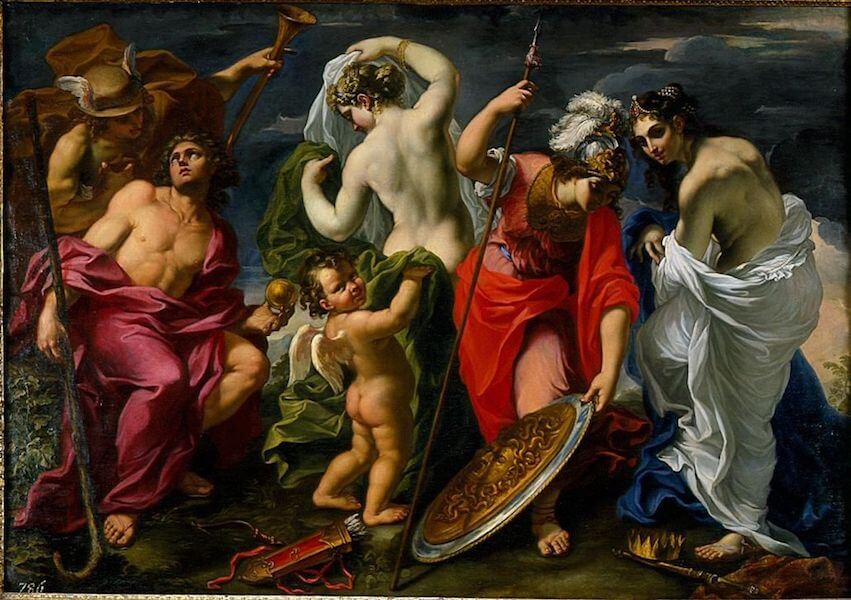
During the trojan war, Aphrodite took the side of the Trojans because in a way she had caused it by a promise to win a contest.
The Most Beautiful Goddess Content
Aphrodite used her irresistible appeal to aid the Trojans in the famed conflict provoked by her. This stemmed from the mythic “Judgement of Paris” contest to determine the fairest goddess.
At the wedding of Thetis and Peleus, the trouble-making goddess Eris maliciously started conflict. She threw a golden apple inscribed “To the Fairest” among the guests, knowing it would trigger rivalry. Unsurprisingly, Aphrodite, Athena and Hera each staked a claim.
When none would yield, Zeus delegated the mortal Paris of Troy as arbiter. Each goddess sought to sway him with bribes – Hera offered political power, Athena martial prowess, and Aphrodite the love of the most beautiful woman alive, Helen (Ἑλένη) of Sparta.
Dazzled and susceptible to the most primal gift of all, Paris awarded Aphrodite the golden apple. True to her word, Aphrodite helped Paris abduct the already married Helen while visiting her home in Greece. Helen fell in love with Paris, and they fled back to Troy. This sparked the 10 year conflict with Menelaus (Μενέλαος), King Of Sparta and Helen’s husband and brother to the great Agamemnon. Thus, Helen became “the face that launched 1,000 ships.”
Achilles says Aphrodite “overpowers the mind and sensible thinking of any immortal or human being.” As well as clouding Helen’s judgement to run off, through Paris she laid waste to the Greek and Trojan armies heedless to the devastation. Only those with sufficient divine aid like invulnerable Achilles could resist. The love goddess caused untold suffering to satisfy personal vanity and her son Eros’s whims. This revealed darker currents within primal love – obsession, infatuation, sacrificing all for the mere promise of fulfillment.
How Was Aphrodite Viewed By The Ancients?
Widespread devotion testifies to how Aphrodite’s beautiful, enchanting presence resonated with millions across the ancient Mediterranean world from Greece to Rome and beyond.
In Athens, she was the patron of the ancient district of Aphrodite surrounded by brothels, theatres, and artist’s quarters. Here games and festivals were held regularly in her honour fusing the arts with hedonistic revelry.
Sicily was home to her most famed sanctuary at Mount Eryx overseeing a bustling pilgrimage route. Since judgement of Paris, doves were her sacred animals, so their nests surrounded the temple. Worshippers burnt offerings, engaged ritual prostitution, left her gifts like seashells, mirrors and roses.
Even as a foreigner, Aphrodite’s impact on local spirituality could be deep and lasting. In Sparta, ephebes’ coming of age rituals were dedicated to Aphrodite rather than their longtime guardian Artemis. In Cyprus and Rhodes, she fused with native mother goddesses to rule important all-encompassing cults.
Yet her appeal was cosmopolitan, not chauvinistic. At Cnidus, a bustling Carian port, her sanctuary welcomed pilgrims from across the Mediterranean. A symbolic marriage ceremony between her statue and the city’s leader was performed annually.
Aphrodite was even welcomed in Egypt, where many Greco-Egyptian deities fused, absorbing the long traditions of spirituality there. Her portrayals often assimilate motifs from the powerful erotico-maternal Isis.
This ubiquitous impact reflects Aphrodite’s uniquely transcendent qualities. Beyond just beauty or sexuality, she represented the deepest yearnings, aspirations, and pleasures inherent to the human condition. People innately recognized her as the divine embodiment of fundamental life forces – love, creativity, intimacy, ecstasy, fertility.
At the same time as this universal essence, Aphrodite’s cult carefully maintained associations with specific ideals prized in specific cultures. In Sparta, the openness and vitality of love. In Rhodes, the enduring divinity of a feminine natural world.
Aphrodite’s International Exchange & Influence
As trade, culture and ideas spread across the ancient Mediterranean world, Aphrodite’s influence transcended the Greek world. Her most iconic incarnation “Venus” merged with Roman gods such as Love (Amor) and Sexual Desire (Libido).
From republican times, moralists critiqued the “decadent” foreign goddess inspiring lust, adultery and disrupting civic order. Yet Venus steadily grew in popularity, especially among less austere classes celebrating pleasure and cosmopolitan values.
Writers like Virgil and Ovid embraced her universal allure. Her divine power over passionate love and through it the governing forces of human affairs was now widely acknowledged.
Venus/Aphrodite rode winged horses, dolphins and swans. Animals like doves, sparrows and hares embodied her spirit in humble yet joyous abundance. Where other gods inspired illusion or intoxication, her transfigurative beauty elevated mortal consciousness.
Her sphere expanded from affairs of the heart to beauty, cultural refinement, and creative ecstasy. Gardens and ‘Venus-Shrines’ dedicated to her aesthetic-spiritual cult grew across empire. One highly influential site was at Pompeii, captured in exemplary mosaics and frescoes before Vesuvius erupted.
From the 4th century BCE, her aura and that of other love divinities from the East intermingled ever more freely across Eurasia, brought by traveling mystics, merchants and armies. She syncretized with Middle Eastern goddesses like Inanna, Ishtar, Astarte and the Egyptian Isis.
This blossomed into syncretic Graeco-Arab and Graeco-Indian mystic philosophies identifying divine love as the fundamental cosmic force. Here she was Aphrodite Ourania – “Heavenly” Aphrodite, dwelling beyond yet infusing the material world.
As the Roman crescent gave way to Christian monotheism, her last vestiges endured in heretical movements like Gnosticism before being absorbed and sublimated into the Blessed Virgin Mary and other saintly female figures. But the ancient world’s artistic patrimony, poetry and mystic teachings left an enduring cultural imprint.
To view all the cults dedicated to her, and see how favorably she was in the minds of many different areas of the world, check out: Aphrodite Cults.
Conclusion
The uniquely powerful allure of Aphrodite, and her impact across the ancient world, represents humanity’s timeless fascination with divine love, creativity, beauty and desire. A figure of profound contradictions, she channeled both unrestrained sensuality and the harmonizing, inspirational force of Venus Ourania.
Embodying fundamental qualities absolutely integral to the full rainbow of human cultural and spiritual experience, Aphrodite was by no means a superficial deity confined to profane, quotidian affairs. In her mythos is contained the deepest yearnings humans feel to transcend individual boundaries and limitations.
She reveals how inextricably bound beauty is to our most intimate desires, but also to meaning itself. In her power to simultaneously inspire euphoric rapture and wreak terrible devastation, she reveals contradictions at the heart of love’s primal forces that still unsettle and transfix people today.
Aphrodite continues to resonate precisely because she reflects back those qualities that are most transcendent, sacred, eternal, and yet fundamentally human. Harnessing zest for sensual fulfillment with the urge to forge harmony and life itself through creative union, she unites the fullest range of divine and mortal wisdom about love.
Ultimately, I find it interesting then that she had to struggle with love her whole life, not being married to someone she truly loved and having to sneak around with Ares.
I suppose that’s something the ancients wanted to teach us, that even the goddess of love doesn’t have it all – she still struggles to encapsulate her very essence by having an unhappy marriage, affairs, and discord.
See more from our Greek Gods Series
Further Readings
If this has piqued your interest, here are some other readings to get you started on your path to learning more about the Greek goddess of love.
- A Honeycomb for Aphrodite: Reflections on Ovid’s Metamorphoses
- Mythology: Timeless Tales of Gods and Heroes
- The Library of Greek Mythology
- The Iliad
- Our Aphrodite inspired recipes (for fun)
We couldn’t have written this without the wonderful website, Theoi. Additionally, good old Wikipedia and a bit from the Dictionary of Greek and Roman Biography and Mythology.


